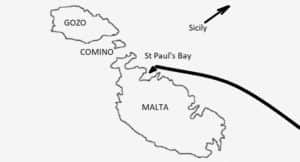GOD’S WORD FOR YOU
ACTS 28:1-2
28 Once we were safe, we found out that the island was called Malta. 2 The native people showed us unusual kindness. Because of the rain that had set in, and the cold, they built a fire and they welcomed us all.
Malta is about 60 miles southwest of the southern tip of Sicily. It is the largest landmass in a small archipelago of three main islands and a number of smaller islets. It has a fairly warm climate, but Paul and Luke arrived there in late November, and Luke remembers the cold and the rain. Because of the climate of Palestine, cold days are rarely mentioned in the Bible except for the night of Jesus’ trial (John 18:18), a few storms (Job 37:9) and some examples used for comparisons in the prophets (“your officials are like swarms of locusts that settle in the walls on a cold day” Nahum 3:17). But Paul had known what it was to be cold in his travels, either in the mountains of central Asia Minor or while lost at sea. He said, “I have known hunger and thirst and have often gone without food; I have been cold and naked” (2 Corinthians 11:27).
The people of Malta spoke a dialect of Phoenician (Punic) that made them sound like Barbarians to Luke (I have translated his word babaroi as “native people”). Islanders were often hostile to visitors. When Ferdinand Magellan was attempting to circumnavigate the globe, he and a few dozen sailors and Christian natives were attacked in 1521 by more than a thousand Mactan warriors in the Philippine Islands who set upon Magellan personally with scimitars and bamboo spears, killing and mutilating the captain. Only one of his six vessels returned to Spain, completing the voyage more than a year later.
On this stormy, cold and rainy winter morning, the Maltese islanders were unexpectedly kind. They built a fire, or more than one, so that the 276 castaways could get warm. These were not people who knew their Savior, but they acted with “unusual kindness,” something also shown by the foreigner in Jesus’ parable of the Good Samaritan (Luke 10:30-35). Sometimes those who do not know God seem to provide an example of godly behavior. This is not to show that there are many paths to heaven; there is only one way to heaven (John 14:6). Rather, when the heathen and Barbarians behave with kindness, this preaches the law to us, showing us the way our behavior should look when it is motivated by love for Christ. Would I have left my quiet breakfast of the local pastizzi pastry with peaches and cherries and warm apple cider to give all my spare blankets to nearly three hundred marooned men in the freezing rain? I can only hope that I would say yes, I would. I pray that my faith will be generous and not reclusive, even though I have often lived as a recluse. We can pray that God will guide us for such times as when we are needed (Esther 4:14).
Luke remembers the feeling they had once ashore, that they were “safe.” This is a Greek word (diasozo) that can mean to save something such as extra food stored away (Micah 6:14) or to escape from danger (Amos 9:1; Daniel 11:42), but also to “not perish” in a shipwreck (Jonah 1:6). Here Luke uses the passive voice, recognizing that they did not save themselves, but were saved by the hand of God. This is how our eternal salvation came about. We were lost, shipwrecked in our sins, but God snatched us from the jaws of death and eternal destruction, set us gently ashore in our place in the world, and through the kindness of Christians and Barbarians alike he has provided for us. “It is by grace you have been saved” (Ephesians 2:5), and God has come to your aid, providing what you need (Ruth 1:6). Remember today as you do your work and care for the plants, the animals, and especially the people in your life, that God provides for them through you. You are his instrument and servant. Will you do it as if you are a Barbarian, or as a Christian? Give God glory with what you do. “Save us, O Lord our God, that we may give thanks to your holy name and glory in your praise’ (Psalm 106:47). “Let us rejoice and be glad,” John says (Revelation 19:7), “and give God glory!”
In Christ,
Pastor Timothy Smith
Listen or watch Bible classes online. Go to splnewulm.org, click on “Watch Worship Live” and scroll to the bottom of the page for archives of sermons, audio Bible studies and video Bible studies.
Additional archives by Wisconsin Lutheran Chapel: www.wlchapel.org/connect-grow/ministries/adults/daily-devotions/gwfy-archive/2021
Pastor Smith serves St. Paul’s Lutheran Church, New Ulm, Minnesota
God’s Word for You – Acts 28:1-2 Barbarian and Christian